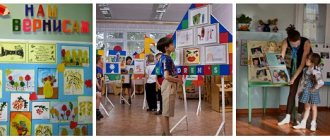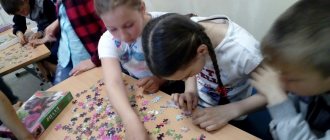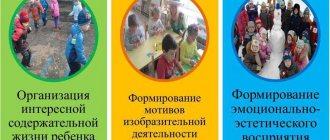Educational and cognitive activity and its features in preschool age
Training is a specially organized interrelated activity of those who teach (teaching) and those who are taught (teaching). In addition to these two components of the learning process, there is a third - learning. Learning is the result of the learning process, which is expressed in positive changes in the development of the child.
The main component is teaching - the activity of the one who is being trained, for the sake of which the learning process is organized. Depending on how the teaching proceeds, certain shifts in the development of the student are observed.
Learning is often seen as synonymous with learning activities: because a child is learning, he is engaging in learning activities. This identification of educational activity and teaching is unlawful.
There are, as S. L. Rubinstein noted, two types of learning, as a result of which a person acquires new knowledge and skills.
1. “One of them is specifically aimed at mastering this knowledge and skills as its direct goal.
2. Another leads to the mastery of this knowledge and skills, achieving other goals.
Teaching in the latter case is not an independent activity, but a process carried out as a component and result of the activity in which it is included.”
For preschool children, the second type of learning is very typical: they acquire knowledge through play, work and other activities. For example, Sasha wants to build the same sand tunnel as he did yesterday, but the sand crumbles. “It turns out that you can’t build from dry sand,” the boy correctly concludes. He received new ideas about the properties of sand, but their acquisition was not the goal of the activity; they were a by-product of playing with sand.
Educational and cognitive activity of preschoolers is the child’s independent activity in acquiring knowledge, abilities, skills, and methods of action.
S. L. Rubinshtein considered educational activity as a type of learning directly and directly aimed at mastering knowledge and skills.
Analysis of educational activities by D. B. Elkonin, V. V. Davydov showed that it has its own structure, a specific structure, namely:
Learning task——>learning activities——>control——>assessment.
The central place in the structure of activity belongs to the learning task. A learning task should not be understood as a task that a child must complete in class. The learning task is the goal. The essence of the goal is to master a generalized method of action that will help complete similar tasks and solve problems of a given type. So, the teacher sets a goal - to teach children to draw a deciduous tree. The main attention is paid to developing the ability to convey the essential features of an object: trunk, branches, their location. Having mastered the generalized method of drawing a tree as such, the child will be able to use it when performing any specific task of similar content (in drawing on the themes “Autumn Tree”, “Blossoming Apple Tree”, “Winter Square”, etc.).
Learning actions, with the help of which learning tasks are solved, consist of many different learning operations. In order for children to master learning actions, they must first be carried out with all operations fully developed. At first, operations are performed either materially - with the help of some objects, or materialized - using images of their symbolic substitutes. For example, while mastering the concepts of equality and inequality of groups of objects, the child will perform actions with toys, pictures, chips that replace real objects or their images. Only gradually, as one or another operation is practiced, the process of performing actions is curtailed and performed immediately as a single whole.
It should be noted that the formation of educational activities, even with well-structured training, is a long process. At preschool age, the prerequisites for educational activity are laid and its individual elements are formed.
In early preschool age, in classes it is necessary to develop in children the ability to set goals for their own activities (at the stage from 2 to 3 years), to teach them to master various methods of activity (at the stage from 3 to 4 years).
After 4 years (middle preschool age), the child’s activities acquire a clear focus on the final result. The teacher teaches children to listen to explanations and complete tasks without interfering with each other; maintains interest in the content of classes, encourages effort and activity. All this is very important for the further development of educational activities.
In older preschool age, the child develops the following elements of educational activity:
- the ability to determine the goal of the upcoming activity and ways to achieve it, to achieve results;
- self-control, which manifests itself when comparing the obtained result with a sample, standard;
— the ability to exercise arbitrary control over the progress of activities in the process of obtaining intermediate results;
- ability to plan activities, focusing on its results.
As the research of A.P. Usova showed, in order to develop a child’s educational activity, it is necessary to develop the ability to listen and hear the teacher, look and see what he shows, and follow his instructions when performing an educational task. A.P. Usova considered the child’s attitude to the teacher’s assessment to be an important indicator of developing educational activity. If a child reacts to a positive or negative assessment of completing a learning task, it means that he lacks the desire for self-improvement (the need to consolidate success, correct a mistake, gain experience), and this reduces his learning opportunities.
Conditions for the successful formation of educational activities:
The successful formation of educational activity depends on what motives motivate it. Externally, children’s activities in class may be similar, but internally, psychologically, they are very different. Often it is prompted by external motives that are not related to the knowledge being acquired and what the child is doing. The kid is not interested in mathematics, but during class he tries to complete assignments so as not to displease the teacher. Or a child doesn’t like to draw, but makes a picture to give to his grandmother for her birthday. In kindergarten, children often study because “that’s the way it’s supposed to be,” “that’s what they’re told to do,” “so they don’t scold them.”
Internal motivation is caused by the child’s cognitive interest: “interesting”, “I want to know (be able to).” In this case, knowledge is not a means of achieving some other goal (“so as not to be scolded,” “should be given to grandma”), but the goal of the child’s activity. The results of educational activities are much higher if they are motivated by internal motives.
Features of the formation of cognitive processes in preschool children
The development of cognitive processes in preschool age occurs in stages. The formation of types, functions, operations of each process of cognition first overcomes the stage of involuntariness.
Younger preschoolers learn about the world involuntarily. They pay attention, perceive and remember only what interests and attracts them.
Since a 3-4 year old child is busy with objective activities, his thinking is also directed only at objects that arouse curiosity.
The main task in the development of cognitive processes is to form the property of arbitrariness. The child must learn to control the functions of cognition and comprehend not only what attracts with its brightness or sonority. The world around us is filled with a variety of objects, phenomena, properties, events, relationships - we have to comprehend them all.
It is possible to get used to and develop in this world only under the condition of purposeful cognition using volitional efforts. This is the arbitrary nature of cognitive processes.
By the time he enters school, along with involuntary perception and attention, it is important for a preschooler to be able to voluntarily use cognitive functions. Elements of voluntariness are laid down on the basis of speech development and such properties as cognitive interest and curiosity.
Stages of cognitive development of preschool children
Definition 1
Cognitive development is a specially organized activity to shape the interests of children, activate their curiosity, develop the desire for knowledge, cognitive work skills and activate the child’s creative potential, through which the study of the surrounding space is realized.
Cognitive development involves the formation of a preschooler’s cognitive interest and skills in implementing cognitive actions in various areas and areas of education, upbringing and development. This turns the process of cognitive development of preschool children into a gradual replacement of some actions by others, i.e. there is a transition from one stage of development of cognition to another, more expanded and in-depth study of processes and phenomena, objects and objects of the surrounding space.
Are you an expert in this subject area? We invite you to become the author of the Directory Working Conditions
Let's consider the main stages of cognitive development of preschool children:
- Curiosity formation stage. Cognitive interest begins to form with the child’s manifestation of interest in some object, process or phenomenon, based on its external attractiveness to him. A child at two or three years of age begins to pay attention to objects that attracted him with their external characteristics: brightness, color, shape. At the same time, the essence and content of this object are not important to him. He shows curiosity about him only based on his external signs.
- Stage of development of curiosity. Curiosity is a child’s desire to understand the essence of a phenomenon or event that interests him. The child moves from curiosity to deeper knowledge: he wants to get to the bottom of what attracted him externally. He feels joy from what he sees and wants to expand it, satisfying his interest.
- Stage of formation of cognitive interest. Its development is associated with specific motivation, i.e. the child wants to know something specific, he is driven by the desire to study this or that object, he strives to know its essence, to expand his ideas not only about the external properties of the object, but also about its internal structure. Cognitive interest can manifest itself as a child’s activity in studying a process or phenomenon, a desire to answer questions about a particular object, and conduct experiments in studying its properties and processes.
- Stage of development of cognitive activity. The cognitive activity of a preschooler is the desire for a full and expanded knowledge of objects in the surrounding world. Cognitive activity is the highest form of cognitive development and the target purpose of educational work with preschool children. The development of cognitive activity is realized through experimental activities of preschoolers, solving cognitive problems and exercises, using project-based work methods and creative activities in a preschool institution. It is the cognitive activity of a preschooler that gives rise to his primary ideas about the world and its structure, the laws of its functioning. Cognitive activity develops due to the work of the cognitive sphere, which includes the following elements:
- Cognitive processes – attention, memory, imagination, thinking;
Information data is information about how this world works, the history of its development and the life experience of previous generations, knowledge and skills of activity that are passed on to the child during upbringing;
- Attitude to the world - the child’s own feelings and emotions experienced during interaction with various objects of the surrounding space, its processes and phenomena, the development of a stable attitude towards them.
Finished works on a similar topic
Course work The essence of activities on the cognitive development of preschool children 490 ₽ Abstract The essence of activities on the cognitive development of preschool children 250 ₽ Test work The essence of activities on the cognitive development of preschoolers 240 ₽
Receive completed work or specialist advice on your educational project Find out the cost



